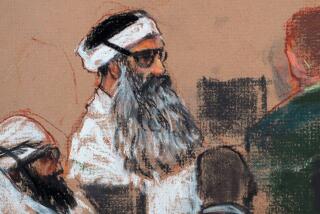Saudi Held in U.S. Backs Out of Plea Agreement
- Share via
WASHINGTON — The FBI’s investigation of last year’s terrorist bombing in Saudi Arabia that killed 19 American service members suffered a major setback Wednesday when a key Saudi suspect refused to honor his agreement to cooperate with U.S. authorities.
The suspect, Hani Abdel Rahim Hussein Sayegh, who was deported here from Canada last month, pleaded not guilty in federal court to conspiracy charges he previously had acknowledged as part of a negotiated agreement. A judge ordered him to stand trial in November.
After weeks of on-again, off-again negotiations with U.S. law enforcement officials, plus a change in defense lawyers, Sayegh had agreed to talk to FBI investigators in return for his expulsion from Canada to the United States.
U.S. officials, angry that he breached his accord, said Wednesday that they plan to try him on charges unrelated to the June 1996 bombing of the U.S. military’s Khobar Towers housing complex in Dhahran, Saudi Arabia. He also is accused of conspiring to kill Americans in Saudi Arabia two years ago, in a plot that was never carried out but for which he allegedly tried to buy weapons and explosives.
Although Sayegh has not been charged in the 1996 attack, U.S. and Canadian intelligence sources believe that he carried out surveillance on the Khobar Towers, gave the go-ahead signal to the driver of a bomb-laden truck that penetrated the complex, and drove an automobile terrorists used in their escape. He allegedly belongs to a terrorist cell with ties to Iran.
If the 28-year-old suspect had provided authorities with evidence that Tehran was behind the attack, it could have led to a U.S. retaliatory strike against Iran.
His decision to withhold cooperation, apparently in hopes of obtaining a better deal, means that the FBI has to rely on information developed by Saudi police if the Khobar Towers crime is to be solved. Sayegh’s cooperation could have given the FBI its first direct access to a key player in the bombing; the Saudis so far have refused to allow U.S. agents to interrogate several dozen suspects rounded up in that country last year.
Frank Carter, Sayegh’s lawyer, told U.S. District Judge Emmet Sullivan that the original cooperation agreement, which is still under court seal, is invalid because his client had a Canadian lawyer and never understood his U.S. rights. Carter told reporters after the court hearing that negotiations with the government to reach a better deal broke down this week and his client decided to contest the unrelated indictment.
The plea agreement reportedly provided for a 10-year sentence, but whether it would have protected Sayegh from future deportation to Saudi Arabia is not clear since the document remains secret. Sayegh has said he fears he would be executed if sent back to his homeland because of his participation in anti-government protests.
Sullivan said he will hold a hearing in September to consider requests from news organizations to make public at least a portion of the now-abrogated agreement.
Carter told reporters that he was confident he could win a trial for Sayegh because the government has only his client’s statements about the earlier plot, and Carter expects to move in court to have those suppressed. “The U.S. government is looking for documentary evidence from the Saudi government” to shore up its case, Carter said.
He insisted, however, that officials have no evidence Sayegh played a role in the Khobar Towers bombing. Asked if Sayegh could provide the FBI with any information about that crime, the lawyer replied, “I have no information that my client knows about that event.”
Carter added that Sayegh may file an application for political asylum in the United States, a move the Justice Department would vigorously oppose on grounds the applicant is a terrorist.
Federal prosecutor Eric Dubelier told Sullivan that the chief remedy the government has when a defendant breaks his plea agreement is to prosecute him on the charge, “and at least today that’s what we intend to do.”
His conditional statement seemed to suggest that the government has the option of resuming plea-bargain negotiations with Sayegh before his Nov. 3 trial. As a tactic to win his cooperation, U.S. officials also could move to deport him to Saudi Arabia, federal sources said.
However, the resolution of any case involving U.S. immigration law--such as deportation or political asylum--could take two years or more due to a lengthy appeals process, according to legal experts. During this period, Sayegh would probably stay behind bars, where Sullivan ordered him to remain pending trial.
Times staff writer Ronald J. Ostrow contributed to this story.
More to Read
Sign up for Essential California
The most important California stories and recommendations in your inbox every morning.
You may occasionally receive promotional content from the Los Angeles Times.













